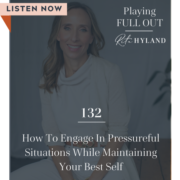Disassembling Old Patterns For Profound Peace & Improved Performance

Listen to the full podcast episode to learn about the science-backed practice that has not only changed my life but also the lives of countless people over the last two decades. This is something you can’t ignore if you want to achieve that great goal you identified for this year and write your new future.
Have you ever found yourself saying, “There’s a part of me that feels this, or a part of me that behaves like that, and I don’t know why?” Perhaps there are times you react in ways that surprise even you?
Do you ever attack when you feel threatened?
Do you immediately fix things when you feel out of control?
Do you overwork when you feel uncomfortable?
If you do, you are not alone. These are just a few of the coping mechanisms we use to protect us when we feel unsafe or things feel out of control.
The problem is that these protective patterns appear to work for us — until they don’t.
Often, it’s not until we find ourselves yelling at coworkers, losing patience with our kids, unable to listen without trying to fix something, micromanaging, being overly reactive or unavailable to those most important to us that we question what is really happening.
The thing is these protective patterns cost us even more as we increase our responsibility and influence.
The good news: we can disassemble and dissolve these destructive behaviors before they hurt our relationships, health, and careers any further.
In this episode, I dive deep into unmasking these patterns of behaviors that up until now we may have seen as an integral part of our success. I’m sharing more of the common coping mechanisms that many of us use to protect ourselves when we feel unsafe, examine how these mechanisms form, why they persist, and, most importantly, give you a way to begin to address and transform them.
The Nature of Coping Mechanisms
Coping mechanisms are behaviors we’ve developed to rid ourselves from uncomfortable feelings such as fear, inadequacy, and unworthiness. These responses often start during stressful times, helping us to endure and self-protect.
While they may have served us well in the past, these reactions often become unconscious habits as we grow older, turning into our Achilles’ heel. They can become destructive to our progress in our lives, careers, and relationships.
The Hidden Impact of Our Patterns of Behavior
One of the challenges of coping mechanisms is that they are often socially rewarded. White behaviors like overworking, being highly productive, or maintaining strict control over diets or exercise routines are praised, they often are distractions that mask deeper emotional distress.
For instance, I used to run from accomplishment to accomplishment to feel successful, numbing my deeper feelings of inadequacy. By constantly achieving, I believed the control would bring me safety. However, even after achieving what I thought would make me feel secure, inner peace and freedom still eluded me.
The Pursuit of Control
Most of us spend our lifetime trying to control things in order to feel safe. We convince ourselves that by controlling our environment or responses, we can shield ourselves from discomfort and pain. But this pursuit of control is short-sighted. We can never truly control everything or everyone around us, and our attempts to do so often worsen our inner turmoil.
Action Steps to Disassemble Negative Coping Mechanisms
Acknowledge and Validate
The first step in transforming these destructive patterns is to acknowledge their existence and validate the part of you that developed them as a means of protection. Recognizing what triggers you allows you to tap into underlying emotions that may have been buried or unrecognized for years. It’s crucial to understand that these emotions are valid, whether they stem from past experiences or current situations.
When you validate the root cause that has gone unaddressed or unhealed, you can give it the air it needs to let something else in. By doing so, you’re not dismissing your feelings but allowing yourself to fully experience and understand them—a powerful first step toward healing.
Name the Triggers and Emotions
Begin addressing your coping mechanisms by identifying the specific people, places, and situations that trigger these behaviors. Name the feelings around them, whether it’s anger, fear, defensiveness, or something else. By doing so, you start to unravel the fears driving your actions, creating space for healing.
Seek Support and Move Forward
The journey of self-discovery and transformation is not one you have to walk alone. Seeking help from professionals, trusted friends, or even a higher power can help you process unresolved feelings and dismantle old coping mechanisms. This support system is crucial as you work to rediscover your true self and step into a space of inner peace and freedom.
The next time you notice certain feeling or behavior, learn to:
- Acknowledge and Validate: Addressing any coping mechanism is to acknowledge that it exists and validate the part of you that developed it to protect yourself. This validation allows you to start the healing process.
- Identify Triggers: Take time to notice the people, places, and situations that trigger your coping mechanisms. Understanding these triggers can help you gain control over your reactions.
- Ask for Help: Don’t be afraid to reach out for help. Whether it’s from a higher power, a trusted friend, or a professional, getting support can make the journey to healing much more manageable.
Coping mechanisms are your mind’s way of protecting us, but they can become destructive if left unchecked. By acknowledging these behaviors, understanding their root causes, and embracing the discomfort that comes with healing, you can begin to dismantle these patterns and move toward the inner peace and freedom you’ve been seeking.
In this episode, I share:
- A deeper understanding of the unconscious fears and feelings that drive negative behaviors.
- The first step to understand why we are running and what uncomfortable feelings you aren’t willing to feel
- Actionable steps to look at what triggers you and what to do instead of reacting to it this week
Resources and related episodes:
- Tune in to the previous episode, How To Get Beyond Your Obstacle Today
- Listen to How To Engage in Pressureful Situations While Maintaining Your Best Self
- If you’d like to be notified of when new podcast episodes are released, you can do so here: Playing Full Out
- Learn more about the Inside Out Method
- Connect with Rita on LinkedIn
Subscribe on Apple Podcasts for more tips, tools, and inspiration to lead the optimal vision of your life, love, and leadership. Remember, a half version of you is not enough. The world needs the fullest version of you at play.
___
About Rita Hyland
With over 20 years of experience as an executive and leadership coach, Rita helps leaders — emerging and established — excel in corporate and entrepreneurial environments.
Rita believes if leaders were more clear about how transformation really works and more intentional about creating what they want, their impact, success, and influence in the world would be unstoppable.
Through her coaching programs, private coaching, and masterminds, Rita shows leaders how to win consistently and create the impact and legacy they desire.
Central to Rita’s work is the understanding that you will never outperform your current programming, no matter how strong your willpower.
When you learn to use Rita’s proprietary Inside Out Method, a technology that uses the best of neuroscience and transformational psychology to hit the brain’s buttons for change, YOU become both the solution and the strategy.
Her mission is to end talented, hard-working, and self-aware leaders spending another day stuck in self-doubt or confusion and not contributing their brilliant work and talent the world so desperately needs.









Leave a Reply
Want to join the discussion?Feel free to contribute!